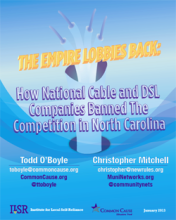
Fast, affordable Internet access for all.

And so each of the last two years, we have had modest increases in the cost of the broadband service, and yet we've had tremendous sales. We're 33%, 31% penetrated. We hope someday all of America has broadband. So the goal would be 100 or 90 [percent take rate]. We have one competitor.And over the course of that 2011 interview [pdf], Roberts makes it clear that he (correctly) regards DSL as a very weak competitor. The only problem Comcast has is in those few markets where they overlap with Verizon's FiOS (or, left unstated, in areas like Chattanooga where the community itself has built a technologically superior network). Credit to Susan Crawford's new book, Captive Audience, where I read it first.
Walking the floor of the Consumer Electronics Show last week, I kept thinking of that line from Jaws, “You’re going to need a bigger boat.” All the Internet-connected, data-hungry gadgets that are coming to market sent a strikingly clear message: we’re going to need faster broadband networks. ... It’s essential to economic growth, job creation and U.S. competitiveness.Yes! If only the head of the Federal Communications Commission understood what is preventing us from building those networks. Hint: It isn't a lack of demand. Google was inundated with applications for its gigabit service. Hundreds of communities have built their own networks (some of which he praises). Local businesses get it. Mayors get it. City councils get it. And unlike Chairman Genachowski, they know what the problem is: little incentive for massive, established cable monopolies to invest in networks when they are harvesting record profits and subscribers have no other choices. Wall Street not only gets it, it actually rejoices in it!
Comcast's traditional Cable Communications continues to grow and generate copious cash flow.. We're big fans of the firm's Video and High-Speed Internet businesses because both are either monopolies or duopolies in their respective markets.What is our FCC Chair doing about this problem? He helped Comcast to grow even bigger, with more market power to crush those rivals that he is calling on to build gigabit test beds. Chairman G wants to spur hundreds of David's while refusing to curb Goliath's power. Bad news, Mr. Chairman, Goliath actually wins most of the time. Rather than doing his job, Genachowski is begging others to do it for him.


In late 2006, Wilson, North Carolina, voted to build a Fiber-‐to-‐the-‐Home network. Wilson’s decision came after attempts to work with Time Warner Cable and EMBARQ (now CenturyLink) to improve local connectivity failed.
Wilson’s decision and resulting network was recently examined in a case study by Todd O’Boyle of Common Cause and ILSR's Christopher Mitchell titled Carolina’s Connected Community: Wilson Gives Greenlight to Fast Internet. This new report picks up with Wilson’s legacy: an intense multiyear lobbying campaign by Time Warner Cable, AT&T, CenturyLink, and others to bar communities from building their own networks. The report examines how millions of political dollars bought restrictions in the state that will propagate private monopolies rather than serve North Carolinians.
Download the new report here: The Empire Lobbies Back: How National Cable and DSL Companies Banned The Competition in North Carolina
These companies can and do try year after year to create barriers to community-‐owned networks. They only have to succeed once; because of their lobbying power, they have near limitless power to stop future bills that would restore local authority. Unfortunately, success means more obstacles and less economic development for residents and businesses in North Carolina and other places where broadband accessibility is tragically low.
It certainly makes sense for these big companies to want to limit local authority to build next-‐generation networks. What remains puzzling is why any state legislature would want to limit the ability of a community to build a network to improve educational outcomes, create new jobs, and give both residents and businesses more choices for an essential service. This decision should be made by those that have to feel the consequences—for better and for worse.
This story was originally posted on the ILSR website.


Investors don’t think too highly of the company either. Charter reported a wider third-quarter loss in November, losing $87 million compared with $85 million lost during the same quarter last year. Executives tell Wall Street the company was in chaos before new management under Tom Rutledge took over operations. Rutledge’s priorities are to invest in new set top boxes, convert more of its systems to digital, raise prices on services, cut back on promotions and retention offers, and centralize customer support operations.Imagine that! When communities have to make investments and suffer losses, they are accused of failing. Charter is losing money (and recently emerged from a bankruptcy proceeding) and trying to make changes to correct its condition. This is what happens to many firms in telecommunications. Only when it happens to those that are owned by communities, they are besieged with claims that such a situation is somehow proof that the public cannot own and operate networks. Note that others, like Comcast, are actually lauded by Wall Street for operating in areas with so little competition that they can increase their rates at will -- hard not to make a profit in that case. Which is precisely why existing cable and DSL companies push laws to restrict local authority to build better networks.
Last year, when Comcast unveiled its Internet Essentials program, the corporate powerhouse received accolades from FCC Chairman Julius Genachowski. The program was promoted as an example of corporate philanthropy helping to bridge the digital divide.
Comcast received all kinds of positive media coverage for its program. Most of that coverage failed to note that the FCC required Comcast to integrate the program as one of the supposed concessions offered in return for Comcast being able to take over NBC -- giving the largest cable monopolist in the US even more market power.
DSLReports has publicly exposed what many of us suspected all along -- the program was not a concession on Comcast's part. Internet Essentials was originally conceived as a program that would offer slower connections to certain low income households at affordable rates that nevertheless remain profitable for Comcast.
A recent Washington Post Technology profile on Comcast's Chief Lobbyist David Cohen, notes how the program was actually conceived in 2009, but:
At the time, Comcast was planning a controversial $30 billion bid to take over NBC Universal, and Cohen needed a bargaining chip for government negotiations.
“I held back because I knew it may be the type of voluntary commitment that would be attractive to the chairman” of the Federal Communications Commission, Cohen said in a recent interview.
Eligibility depends on four factors:
